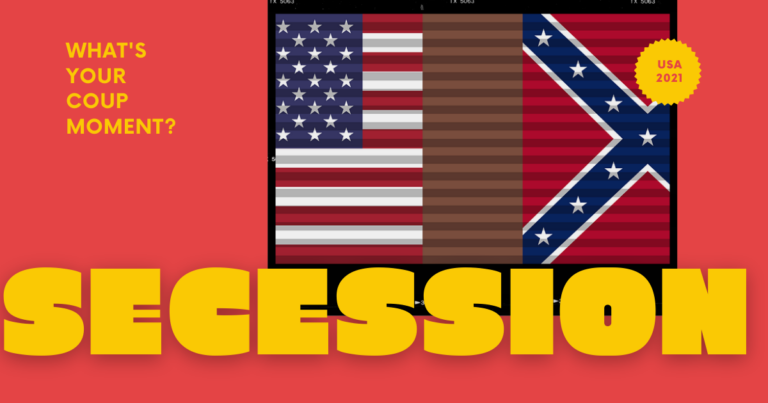
As rights are not granted by the state, an entity that derives its powers from the consent of the governed, the people have the ultimate power to alter or abolish a government that infringes upon the rights of the individual. Once thought unimaginable to modern Americans, the idea of a state or geographical region departing from our federation is now commonly discussed.
“America’s growing political divide,” a collection of words uttered endlessly in all forms of media to describe an escalation of tensions within the United States, has an inevitable consequence. As we have seen with both “red” and “blue” factions, America’s rapid shifts in either political direction have sparked media endorsed violence and overall mitigations of civility.
Your “coup” moment
When a small band of misfits publicly planned and then stormed an intentionally open (1,2) Capitol, they acted off a genuine belief: The America they endorse and reside within has been threatened. While you can disagree with the Trump supporters who “took action” that day, the event should beg a question from all sides: Is there a scenario where you would invade the Capitol?
For those who viewed Trump as “literally Hitler,” would internment camps or reinstitution of formalized segregation cause you to seek a remedy for the violations? If the scientific community becomes even more worried about the impact of climate change, what would be your priority if the government refused to adapt? For conservatives, is there a point where you no longer feel represented enough in our country to impact national/state policy? What if elections switched to online affairs – and the Democrats won 2 consecutive national elections? For both sides, what is your next move if you no longer feel represented and able to non-violently defend your rights in this nation?
How likely is a coup?
In both the American Revolution and Civil War, we saw a geographical region with a distinct culture arrive at the conclusion that their way of life was under severe threat.
A trifecta is a term referring to a scenario where one political party holds the governorship, a majority in the state senate, and a majority in the state house in a state’s government. 80 percent of Americans currently live in a trifecta state, indicating strong policy preferences for the residing populations. With such differing belief systems, the increasing centralization of our government makes each national election a monumentally big deal. An executive, armed to the teeth with executive orders and dependent on the loudest elements of their party, has the ability to drastically impact the lives of those who do not share the same ideology.
Even worse, human contact has been largely replaced with what is found on social media. When a man in a MAGA hat is punched out at a gas station, that video makes its way across America – solidifying the divide and reaffirming negative stereotypes of the “OTHER.”
The bight side of secession
A secession plank in a party platform serves the same function as setting clear boundaries within a relationship. If you’ve ever stated to a partner that infidelity would dissolve the union, you’ve essentially created a secession plank. Coming out of an abusive and English relationship, Thomas Jefferson was keenly reminding future generations of the perpetual danger of tyranny when he included his justification for secession in the first paragraphs of the Declaration of Independence.
In a republic melting under the hot sun of distortion, what harm is there in drawing a line in the sand for the sake of at least symbolic integrity? Libertarian commentary
I think secession is highly unlikely. We are connected to each other in so many way–with roads, highways, commerce, radio, television, the Internet. Not only that, the Federal government has cameras, monitors and other electronic devices that makes any secret activity almost impossible.
If history is any guide, people tend to be willing to take only so much abuse.
Cialis Et Fertilite
Kamagra 100mg Test
Comments are closed.